Keywords: Christmas Island
-
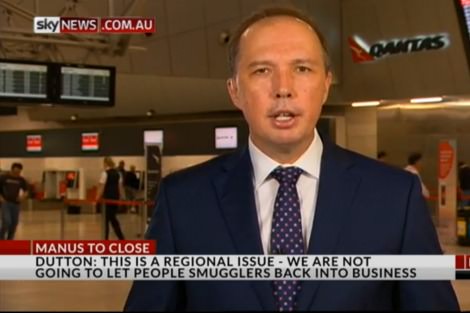
AUSTRALIA
- Kate Galloway
- 02 May 2016
23 Comments
I have often wondered at the likely success of entreaties to compassion for asylum seekers. This is not because I do not personally feel compassion for these people. And it is not because I do not believe that it is morally correct to show compassion, including through government policy. Rather my response is partly a factor of my training as a lawyer. Through my legal eyes, I can see little hope for appeals to politicians to show compassion. My conditioned response instead is to appeal to law.
READ MORE 
-
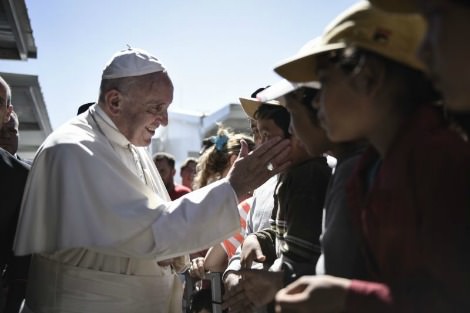
RELIGION
- Andrew Hamilton
- 19 April 2016
15 Comments
Lesbos is famous for crossing boundaries. It was the home of the poet Sappho and the tender, delicate lyrics dedicated to the woman who was her lover. More recently it has been the home of refugees who have crossed from the murderous conflict in Asia. Pope Francis is also as famous for crossing boundaries as we Australians are for patrolling them. He is reinventing the papacy as a one-man barbed-wire-cutting team. So it is not surprising he decided at short notice to cross into Lesbos.
READ MORE 
-

ARTS AND CULTURE
- Gillian Bouras
- 16 March 2016
9 Comments
It was a bright winter's day when we visited Iphigenia. Long widowed, she was meticulously turned out in black traditional outfit. Iphigenia is not sure how old she is; she thinks she is 86. Anglophones regularly make a hash of this beautiful name, the correct pronunciation of which is Ifeeyainya. But the ones I know are intrigued by the mythological character, who was ill-fated, to say the least. I soon learned that there had also been ample sorrow and trauma in the life of the modern Iphigenia, too.
READ MORE 
-
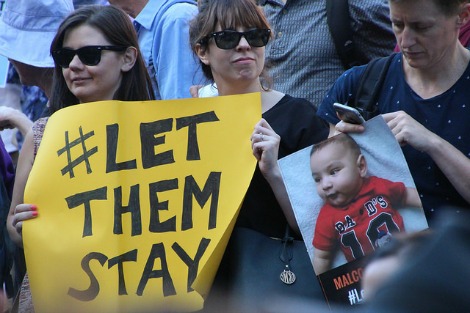
AUSTRALIA
- Andrew Hamilton
- 11 February 2016
15 Comments
The High Court decision on detention in Nauru came down just before the Christian season of Lent. It left the government free and determined to deport many young mothers and children to Nauru. For the mothers and children deportation will bring new trauma with renewed threat to their already precarious mental health. For the Australian public it again makes us ask what brutality, even to children, we are ready to tolerate. The savagery of this treatment is a suitable subject for Lenten reflection.
READ MORE 
-
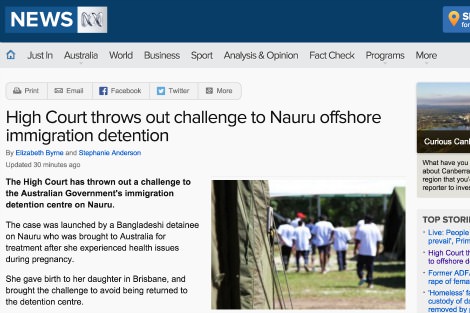
AUSTRALIA
- Frank Brennan
- 04 February 2016
24 Comments
Following Wednesday's High Court decision, the moral depravity of Australian funded offshore detention of asylum seekers, including children, is to continue. There is no joy to be found in our High Court applying a Constitution even more bereft of human rights protections than that of Nauru. It's time for our politicians to address the political and moral question: what purpose is actually served by sending this mum and her baby back to Nauru, when the boats have already stopped and will stay stop?
READ MORE 
-

AUSTRALIA
- Frank Brennan
- 10 December 2015
I first met this Tony on my regular visits here to Darwin when he was working at the North Australian Aboriginal Legal Aid Service and then when he set up the mediation services under the auspices of Anglicare. In later years I knew him when he was your Anti-Discrimination Commissioner. He was a quiet, considered, gentle, strong and principled man. On Human Rights Day, it is only fitting that I honour Tony by offering some reflections on the architecture for human rights in Australia, on the contemporary human rights controversies, and on the way forward for better protection of the human rights of Aborigines and asylum seekers, two marginalised groups who had a special claim on Tony's sympathies.
READ MORE
-

RELIGION
- Frank Brennan
- 04 December 2015
1 Comment
'Tonight, gathered here in the Southern Cross Club in the national capital, gathered as Eureka's children. We affirm that there is room for everyone under the Southern Cross. I hope you will return to Canberra carrying the Southern Cross flag when we proclaim the Australia Republic on 1 January 2020 which will be two elections after Australia last had a monarchist leader of a major political party. Tony Abbott is the last of his type. Whether the prime minister honoured to witness the proclamation is Malcolm Turnbull, Bill Shorten or another matters not.' Annual Dinner for Eureka's Children, Southern Cross Club, Canberra, 3 December 2015.
READ MORE
-

RELIGION
- Frank Brennan
- 27 November 2015
2 Comments
'The crisis of child sexual abuse in our societies has required that our institutional procedures be more transparent and that we learn from the ways of the world in exercising power openly and justly. This means we have to restructure some of our church arrangements so that power is exercised accountably and transparently. All of us who have positions of influence and power in institutional churches need to be attentive to the voices of those who have suffered within our institutions.' 'Discerning the place for the prophetic voice and pragmatic cooperation of the churches in the great moral questions of the age', address to the Association of Practical Theology in Oceania conference, 26 November 2015.
READ MORE
-

AUSTRALIA
- Andrew Hamilton
- 26 November 2015
6 Comments
Questions remain regarding the recent death and disturbance on Christmas Island, posed by the responses by New Zealand and Australian government ministers to the unrest. New Zealand Internal Affairs Minister Peter Dunne compared the Christmas Island regime to Guantanamo Bay. Australian Minister for Immigration Peter Dutton emphasised the $10 million damage to property. Both responses were partial. At a deeper level the riot was the predictable outcome of a brutal government policy.
READ MORE 
-

AUSTRALIA
- Justin Glyn
- 21 October 2015
11 Comments
While running a Royal Commission into domestic violence and a $30 million campaign against it, ringing the bell marked 'asylum seekers are queue jumpers' has allowed successive governments to abuse alleged rape victims with barely a word of protest from the public. Insofar as any feelings of empathy for asylum seekers exist, we tell ourselves brutality is inflicted 'to stop deaths at sea'. So successful has this Pavlovian policy been that Australian refugee policy is now the toast of German neo-Nazis.
READ MORE 
-
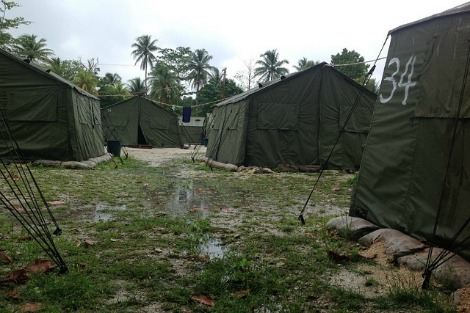
AUSTRALIA
- Frank Brennan
- 05 October 2015
28 Comments
Anyone hoping a Turnbull government will be more accommodating of boat people than an Abbott government will be sadly mistaken. But that is not the end of the matter. Now that the government has firmly closed the entry door to Australia, there is no warrant for maintaining the chamber of horrors in the Pacific which was set up as a 'circuit breaker' deterrent. Turnbull needs to admit that a purposeless chamber of horrors is not just harsh; it is cruel, and it is unAustralian.
READ MORE 
-

- Frank Brennan
- 18 September 2015
Pope Francis's concerns are not narrowly dogmatic or pedagogical but universally pastoral. He knows that millions of people, including erstwhile Catholics, are now suspicious of or not helped by notions of tradition, authority, ritual and community when it comes to their own spiritual growth which is now more individual and eclectic. He wants to step beyond the Church's perceived lack of authenticity and its moral focus on individual matters, more often than not, sexual. He thinks the world is in a mess particularly with the state of the planet — climate change, loss of biodiversity and water shortages, but also with the oppression of the poor whose life basics are not assured by the operation of the free market, and with the clutter and violence of lives which are cheated the opportunity for interior peace. He is going to great pains to demystify his office. He wants all people of good will to emulate him and to be both joyful and troubled as they wrestle with the probl
READ MORE